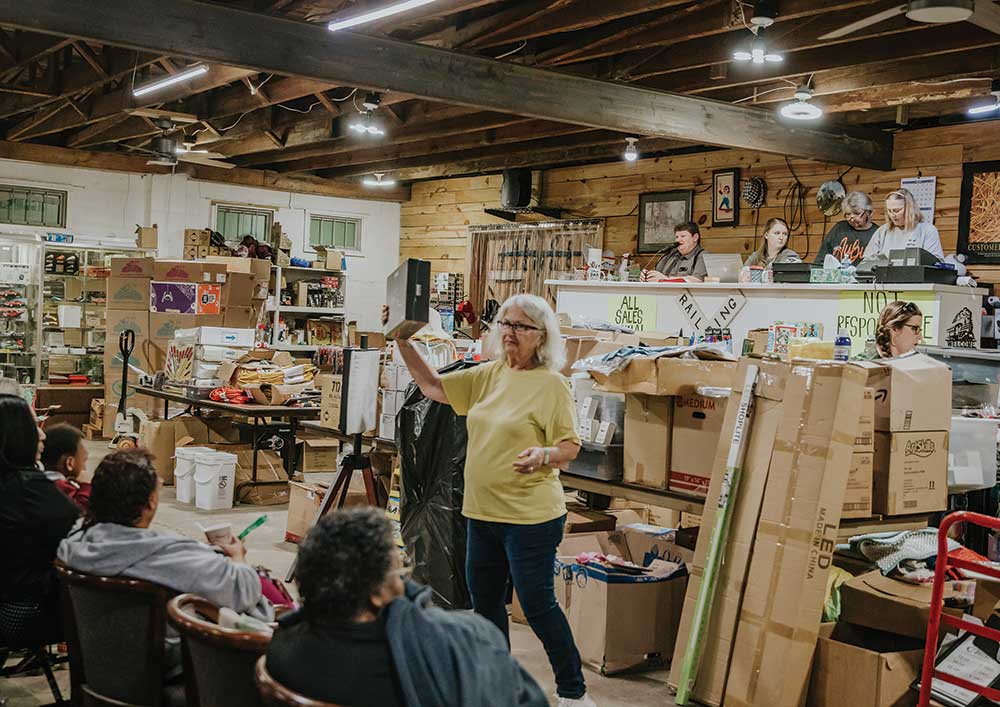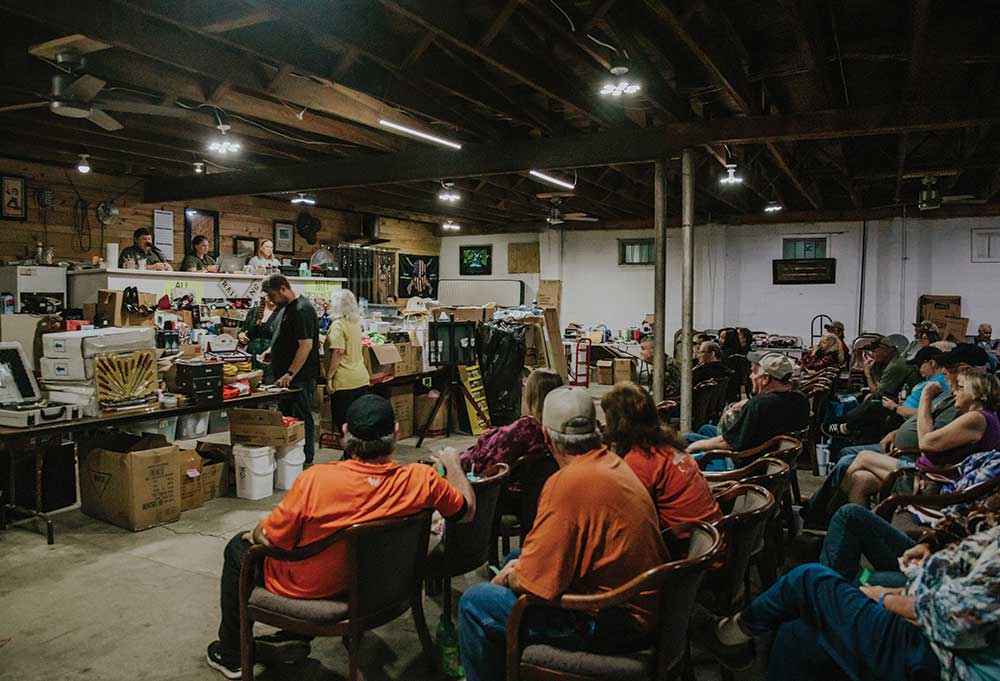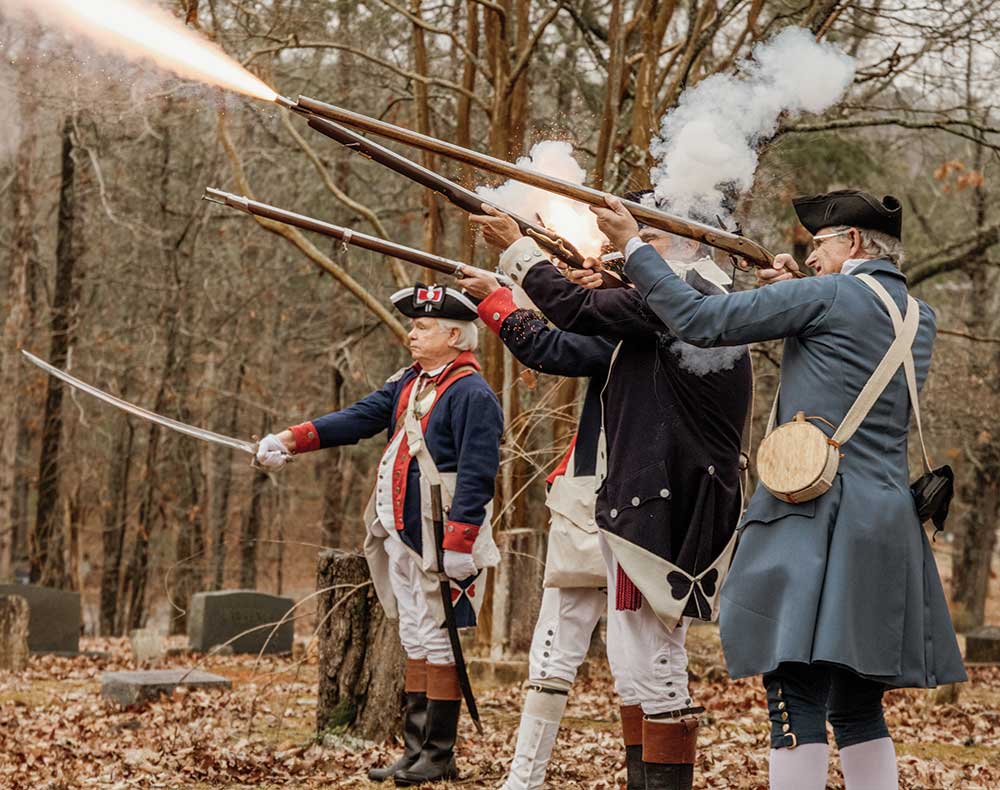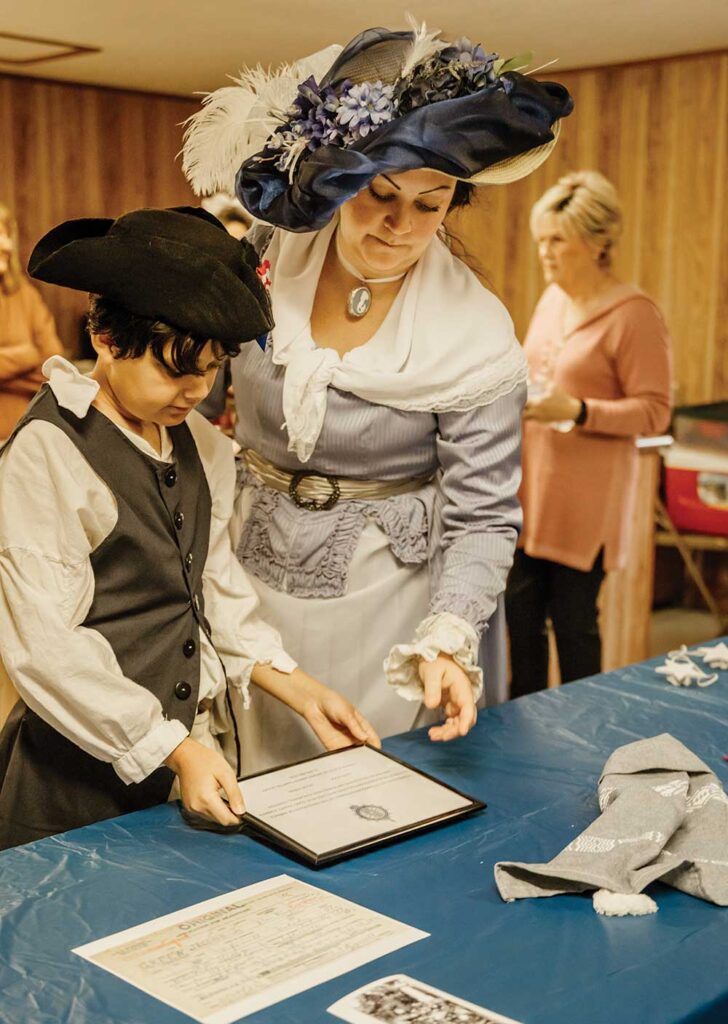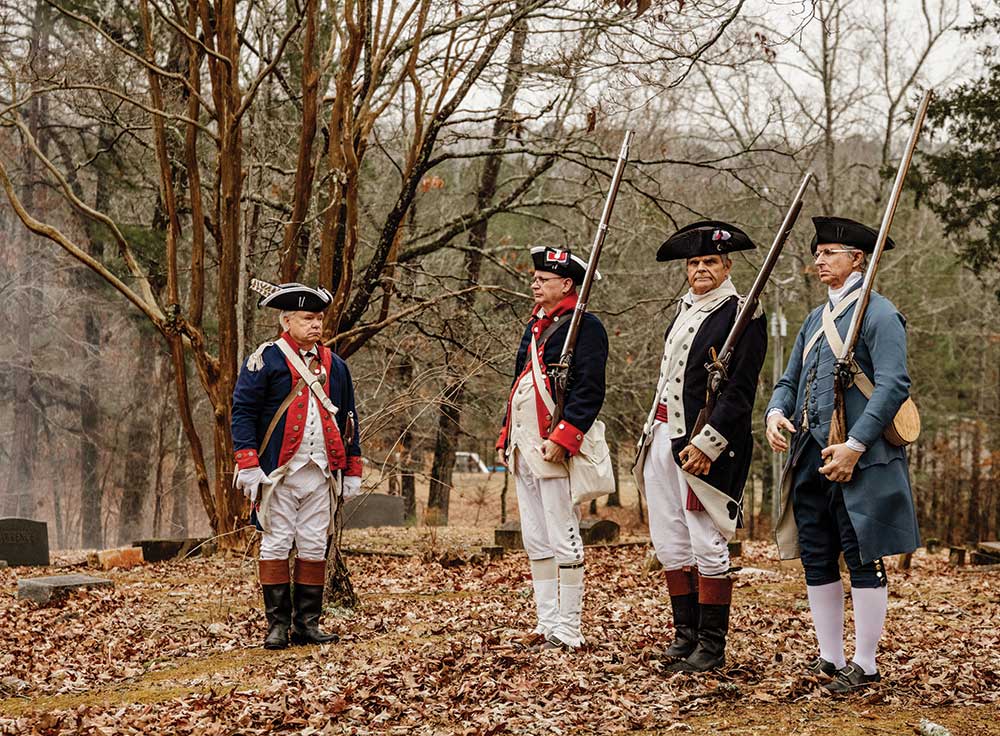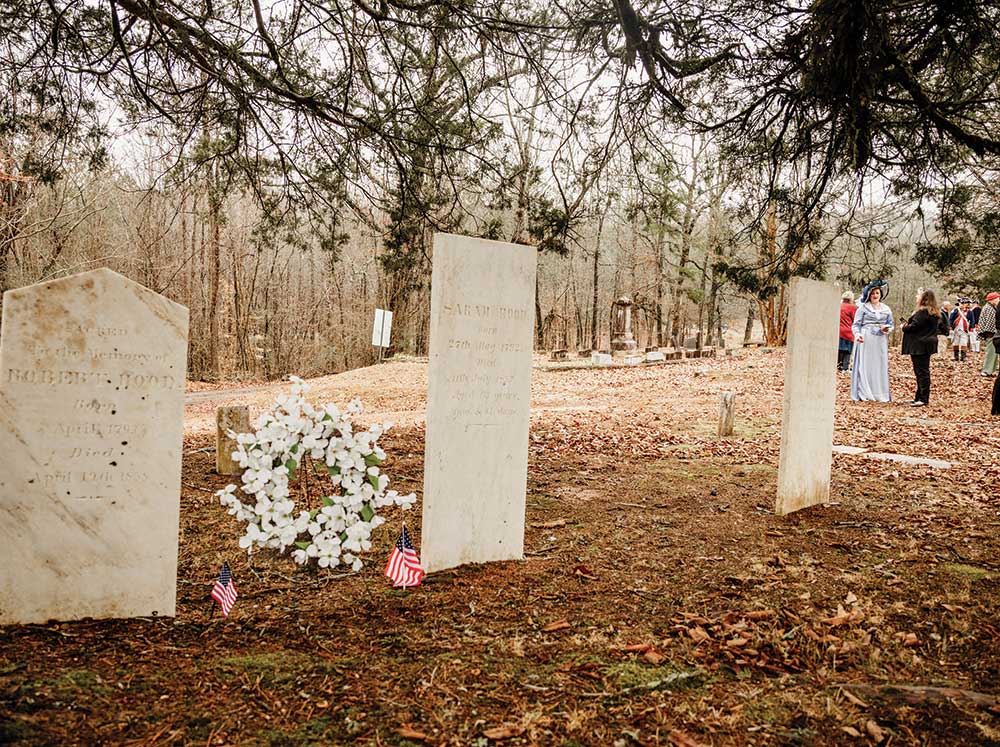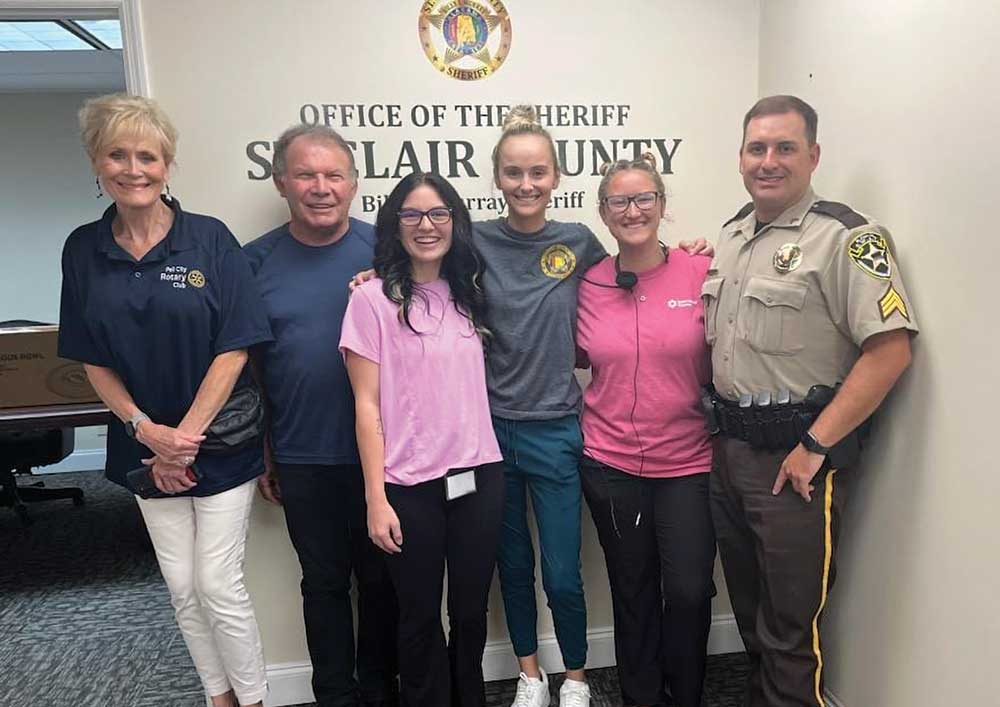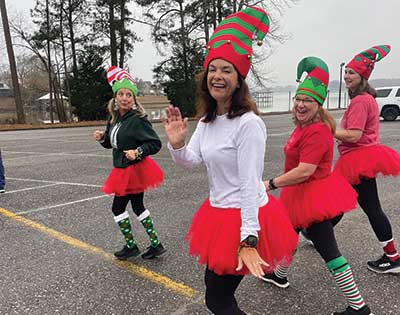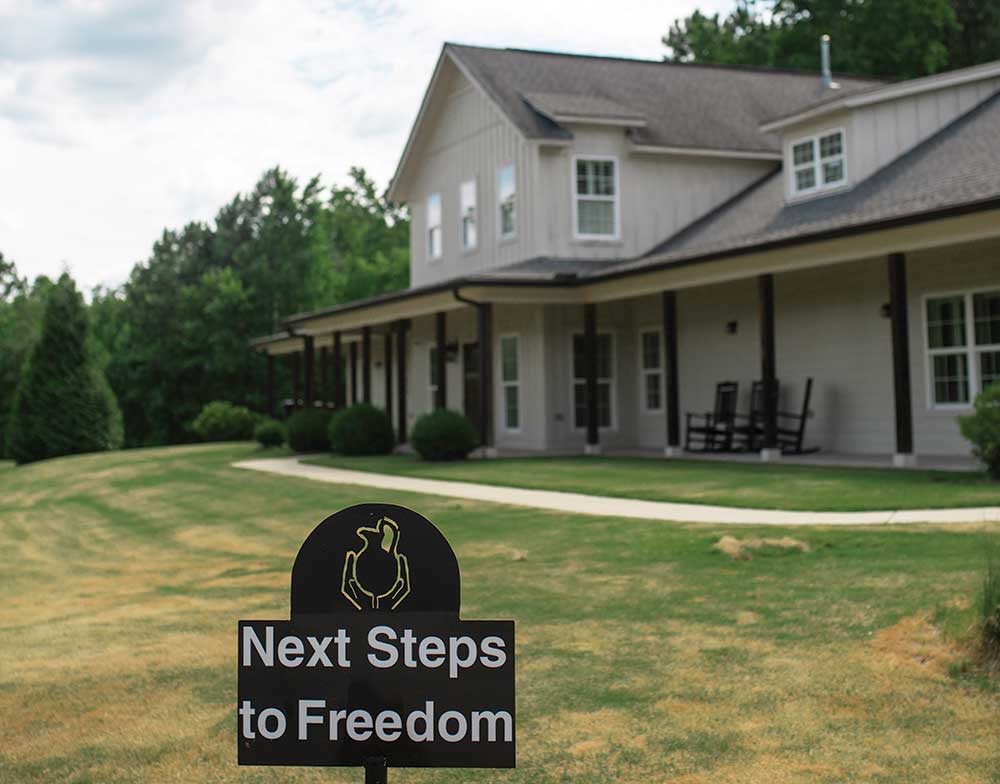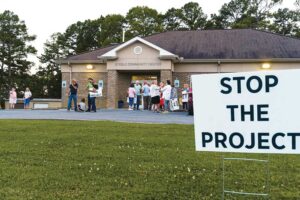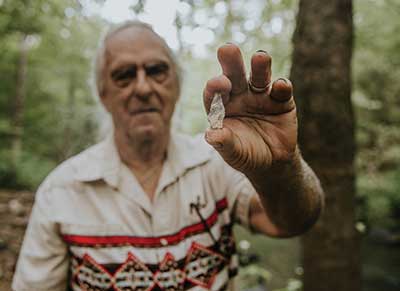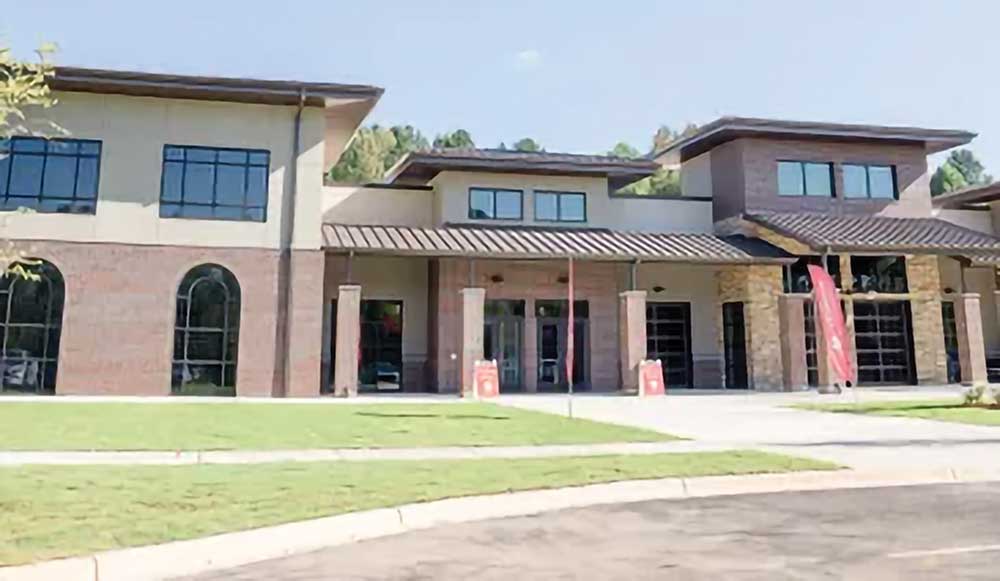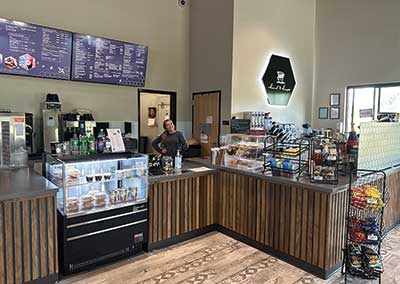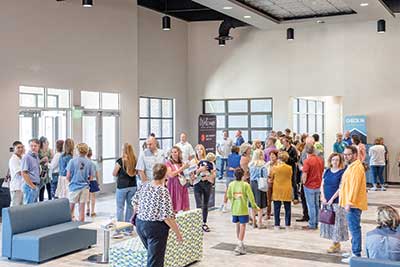Center of great buys and entertainment
Story by Elaine Hobson Miller
Photos by Mackenzie Free
“Hey, well, alright sir.
Here we go there and what are ya’ gonna give for ‘em?
I have a 600 dollar down here now ten and now 25 and
Now 35 and now there 50 now 60 will ya’ give me 60?
Now 75, 75 another 85 dollars and buy ‘em there.
It’s Saturday night at the Railroad Auction House in Steele.
General merchandise – thermal socks, gloves, cookware, purses and makeup bags, speakers and phone chargers, are displayed in boxes and packages on and around tables on one side of the room.
In front of the raised auctioneer’s booth, more tables display toys and tool sets, pet beds, jewelry and glassware. Others hold a pile of blankets, a heater, a drone, an espresso machine and more.
It’s like a going-out-of-business sale at Big Lots, except there are no price tags, and people bid on the items, hoping to get them at a price they want to pay.
Many of those people are regulars here, bringing their canvas shopping bags and their registered bid cards each week. Most of them leave with their bags full. But it’s not just the merchandise that attracts them. The whole affair is sheer entertainment, which suits the auction house just fine.
“I want everybody to have a good time,” says owner/auctioneer Henry Whisenant. “That’s my goal, to make it entertaining and fun to be here. We’re family-oriented, and we give people things to laugh about.”
Henry knows most of the regulars, calling them out by name. “You want two of these, Bernice?,” he asks one patron regarding aprons that go for $5 each. Speaking about another woman who places a bid on ear muffs, he jokes, “She says she wants ‘em so she can’t hear hubby snore at night.”
Tim Abernathy and his wife, Teresa, frequently drive from Sand Rock to shop and have fun. “We bought all our Christmas gifts here last year, spent about $600-plus,” Teresa says.
“We come here every weekend,” says Christina Lynn, the other half of the “we” being husband Charles. “We like the people who own it, and it’s a good place to buy stuff you need. I buy food, things that I want like home decorations. You never know what you will find. They have good products, and it’s a fun environment.”
25 dollar bid it now, 30 dollar 30
Will you gimmie 30 make it 30
Bid it on a 30 dollar will you gimmie 30
Who’ll bid a 30 dollar bid?
30 dollar bid it now, 35, will you gimmie 35
To make it 35 to bid at 30
Who would a-bid it at a 35 dollar bid?
Each person who wants to bid has anassignednumber, one that he keeps from week to week. Numbers are recorded alongside names so the house can collect payments at the end. The house makes its money by taking a percentage of the sales.
“We have different sellers each week,” Henry says. “Most of the time we have what we call a main hauler, who brings in most of the items for sale that night. They buy in bulk at other locations and sell individually here.”
Tonight’s “main hauler” is Linda Robbins, who brought a lot of personal-use and gift items. “Our prices are cheaper than the box stores,” she says. “It’s one avenue to get out surplus merchandise, and it’s lots of fun.”
John Whisenant (Henry’s son) acts as a sort of runner, going up and down the aisles holding up small goods as his dad goes through the bidding, which includes a description of the product. Carol Ditto or Corey Whisenant, John’s wife, type it into the computer. Once the bid closes, the high bidder gets as many of the items as he or she wants, then other bidders get a chance at what’s left.
“Say the seller wants $10 each for certain items, and the winning bid was $8,” Henry explains. “They will take care of the winning bidder and if there are multiples, high bidder gets what he wants first. Then they go back to second highest for next choice at $10 each. First comes the high bidder, then the backup bidder, then all who bid on it, then seller opens up what’s left to the floor.”
35 dollar bid it now a 40 dollar 40
Will you gimmie 40 make it 40
Bidin’ it on a 40 dollar will you gimmie 40
Who’ll bid a 40 dollar bid?
40 dollar bid it now, 45, will you gimmie 45
To make it a 45 to bid it a 45
Who would a-bid it at a 45 dollar bid?
While Henry is doing his selling chant, John will call out “821 for 3,” etc., referring to the number of the bidder and how many he wants to buy. As John holds up Bluetooth speakers shaped like toy cars with built-in AM/FM radios and headlights that actually light up, his dad tries to start the bidding at $35 each. He has to keep coming down before he finally gets a bid of $20. Then he gets it up to $22.50, then $25, then SOLD!
Outside, a train roars by about the time Whisenant ends his
auctioneer’s chant, reminding folks of how the auction house got its name. Henry started this business in May of 2003, and now has a second building for his antiques and vintage collectibles auctions up the road at Steele Wholesale Auction.
“I grew up going to auctions and always wanted to be an auctioneer,” he says. “I’ve been one about 10 years. It took me a long time to get up in front of people. I’ve done different things in the meanwhile, such as mechanic, maintenance man, steel construction and truck driving.”
He went to an auction school to get some training. “The only reason I went was it was out of town and no one knew what I was doing,” he says, laughing. “At that time, I was driving a semi, and it just worked out.”
Henry says he got into auctioneering at an older age than most, so he isn’t as good as some of the younger folks. “We didn’t work a lot on chants in school,” he says of the famous way auctioneers carry on the process of bidding. “It was a nine-day course, and you learn more about how to put on an auction and the business side of it. As for the chant, you gotta run it together, so that, ‘What do you bid?’ becomes, Whattaya bid, whatta gone bid.”
45 dollar bid it now a 50 dollar 50
Will you gimmie 50 make it 50
Bidin’ it on a 50 dollar will you gimmie 50
Who’ll bid a 50 dollar bid?
50 dollar bid it now, 55, will you gimmie 55
To make it a 55 to bid at 55
Sold that hog for a 50 dollar bill
Jeanette Green of Centre, Brenda Leek and grandson Keem of Rome, GA, and Edith Taylor of Gadsden came to the auction together tonight. “They have good sales and some good people here,” says Green. “I bought a lighted bar for the back of my husband’s truck once. I also bought large speakers for cell phone music.”
Leek doesn’t have to worry about entertaining her grandson while at the auction. A child-sized table with games and crayons is set up in one corner, along with a couple of tricycles. So, the little tykes pedal up and down the side lanes during the auction, ignoring the chanting and the bidding.
In the fall, as Christmas nears, some of the regulars buy toys and clothes at the auction and put them in the house’s “Toy Box.” Some folks from Church of the Nazarene in Steele (pastor James and wife DeeDee Kilgore, and Rodney and Brenda Free) take them to the elementary school in Steele, where the faculty distributes them to needy kids at Christmas. If an abundance is left after Christmas, the teachers will award points for good grades, and the kids can use their points to buy what’s left. “The auction house also donates to the Toy Box, and some of the haulers, too,” Henry says.
The aroma of popcorn permeates the air during the auction, temporarily taking a person’s mind off the bidding. Donna Bellew, also from Steele, handles the concession stand, selling snacks such as hot dogs, cheesy nachos, popcorn and canned sodas.
Roy Phillips, Steele, comes for fun, and buys an item or two every now and then. “We sit over here and laugh and carry on,” he says, motioning toward the other two or three people who are on the “old-timers’ bench” with him. The bench alongside one wall was so-named by Henry, the auctioneer, probably because his dad, Henry Sr., of Steele, sits there. Often, they are joined by Ellen Jenkins of Chandler Mountain.
“We come every Saturday for the entertainment,” Phillips says. They talk about how old the building is, how it was a hardware store for many years with a post office in one corner. Paul Pope owned the building back then, and had a gas pump, sold tires, meat, and general merchandise.
Bidder No. 846, Gaynelle Sweatt of Ragland, says this is her first time at the auction. She learned about it on Facebook.
“We’ll be back,” she says.
Editor’s Note: The paragraphs in italics throughout this article are from the 1956 Leroy Van Dyke version of the song, “The Auctioneer,” which was written by Van Dyke and Buddy Black.












